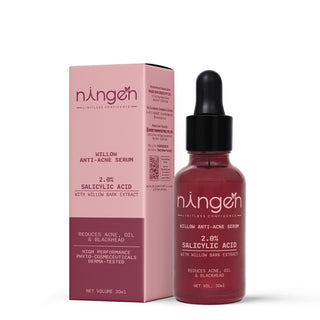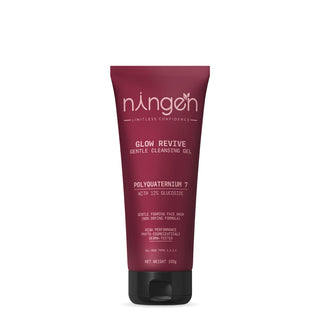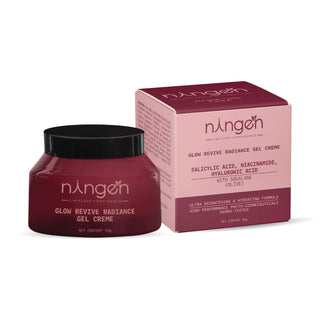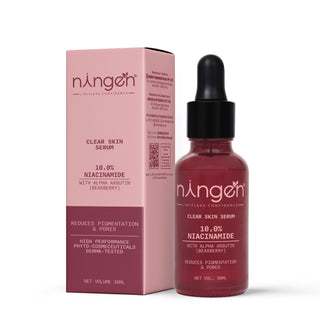Nobody likes pimples.
They ruin your day and make you feel insecure. They're not just a problem for teenagers, either. Pimples can pop up at any age and be a real pain to deal with. They can mess with your self-confidence and make you feel uncomfortable in your skin.
Now, do you know why pimples keep coming on your face?
How to stop pimples coming on face? Or
How to remove dark spots caused by pimples?
The good news is that preventing pimples and the dark spots caused by them is possible with some simple and practical steps.
In this blog, we will delve into how to prevent pimples coming on your face that can help you maintain a clear and healthy complexion. From understanding the root causes of pimples to adopting a daily skincare routine and making lifestyle changes, we’ve got you covered.
Read on to discover straightforward and actionable tips to keep those unwanted pimples at bay and enjoy smoother, clearer skin.
Celebrate every blemish-free day!
In This Article;
- What Are Pimples
- Types of Pimples
- Understanding the Causes of Pimples
- How to Prevent Pimples Coming on Your Face?
- Ingredients Help to Prevent Pimples on Face
- The Importance of Regular Exercise for Preventing Pimples
- Maintaining Proper Hygiene Habits to Prevent Pimples
- Final Thoughts
- TL;DR(Too Long Didn't Read)
- Frequently Asked Questions
What Are Pimples
Pimples are small, red, inflamed bumps that form on the skin when hair follicles become clogged with oil and dead skin cells. They are most common during the teenage years but can occur at any age, often causing frustration and embarrassment. Pimples are a type of acne and can appear anywhere on the body, but are most commonly found on the face.
They are a widespread skin issue that arises when hair follicles become blocked with oil and dead skin cells, resulting in small, red, inflamed bumps on the skin's surface. While often associated with adolescence, pimples can appear at any age and are a common source of frustration and embarrassment for many individuals.
Types of Pimples
- Whiteheads: Small, white, or flesh-colored bumps that occur when pores are clogged with oil and dead skin cells. The pore remains closed at the surface.
- Blackheads: Similar to whiteheads, but the pore remains open. The dark appearance is due to the oxidation of the oil and dead skin cells inside the pore.
- Papules: Small, raised bumps that are usually red and tender to the touch. They do not contain pus.
- Pustules: Red, tender bumps with a white center of pus. They are often referred to as "pimples."
- Nodules: Large, painful, solid pimples that are deep within the skin. They can be red or flesh-colored and often do not come to a head.
- Cysts: Deep, painful, pus-filled pimples that can cause scars. They are larger than pustules and nodules and may need medical treatment.
Understanding the type of pimples you have can help you choose the most effective treatment and prevention strategies. If you have severe or persistent acne, it's advisable to consult with a dermatologist for personalized treatment.
Understanding the Causes of Pimples
Pimples, a common skin condition, result from various factors such as genetics, diet, hormone levels, and skincare routines. Hormonal changes, stress, certain medications, and pore-clogging products are common triggers. Identifying your skin type—whether oily, dry, or sensitive—helps in choosing the right products to prevent and treat pimples effectively.
Importance of Dead Skin Cells
Dead skin cells, if not exfoliated properly, can accumulate and clog pores, leading to acne. Proper exfoliation with gentle cleansers and products containing salicylic acid can remove these cells, preventing pore blockages and reducing acne breakouts.
The Role of Acne-Causing Bacteria
Bacteria like Propionibacterium acnes thrive in blocked pores, causing pimples. These bacteria can exacerbate acne from mild to severe forms. Topical antibiotics and antimicrobial products can control these bacteria, reducing pimple formation.
Impact of Clogged Pores on Acne Formation
Clogged pores, caused by oil, dead skin cells, and impurities, are a primary factor in acne development. This blockage can lead to whiteheads and blackheads. Regular cleansing with gentle products and avoiding greasy foods can keep pores clear and minimize acne.
Influence of Oil Glands on Pimple Development
Sebaceous glands produce sebum, an oily substance crucial for skin protection. Excessive sebum can lead to oily skin and pimples, often stimulated by hormonal changes. Treatments that regulate sebum production, along with a balanced diet and proper hydration, can help manage oily skin and reduce pimples.
Note: Do you know the difference between acne & pimples? Click on the link to know about it.
How to Prevent Pimples Coming on Your Face?
1. Effective Cleansing Routine
A consistent cleansing routine is essential for preventing pimples. By regularly removing excess oil, dirt, makeup, and dead skin cells, you can significantly reduce clogged pores and acne breakouts. Tailor your routine to your skin type with the right mix of products and techniques. Cleanse your skin in the morning to remove overnight oil buildup and in the evening to clear away the day's impurities.
The Benefits of Warm Water for Facial Cleansing
Warm water can enhance your facial cleansing routine by opening up pores, making it easier to remove dirt, oil, and makeup. This promotes a thorough cleanse and prepares the skin for subsequent treatments. Avoid hot water, which can strip natural oils and cause dryness, and cold water, which may not effectively dissolve oily substances. Warm water is the optimal choice for promoting healthy skin.
Choosing the Right Facial Cleanser
Selecting the right facial cleanser is critical for maintaining clear skin. Depending on whether your skin is oily, dry, sensitive, or a combination, specific formulations can optimize your cleansing results. Acne-prone skin may benefit from salicylic acid cleansers, while dry or sensitive skin should use hydrating, gentle cleansers to maintain the moisture barrier. Avoid potential irritants and choose cleansers that address your unique skin concerns.
Importance of Cleansing Twice Daily
Cleansing twice daily is crucial for preventing pimples and maintaining a healthy complexion. Morning cleansing removes overnight oils and prepares the skin for other products. Evening cleansing removes the day's pollutants, sweat, and makeup, preventing them from clogging pores. Double cleansing, starting with an oil-based cleanser followed by a water-based one, is particularly beneficial for those using heavy makeup or sunscreen. Consistent facial hygiene is key to preventing severe acne and maintaining a strong skin barrier.
2 . Maintaining a Balanced Diet: An Important Step to Prevent Pimples
A balanced diet plays a fundamental role in overall health, including the health of your skin. Consuming a variety of nutrients can directly impact the condition of your skin and potentially minimize the possibility of acne breakouts. According to the NCBI – Journal of Clinical, Cosmetic and Investigational Dermatology, to foster healthy skin, aim to integrate a spectrum of vitamins and minerals from fruits, vegetables, lean proteins, whole grains, and omega-3 fatty acids into your daily meals. Remember to hydrate sufficiently, as water plays a crucial part in removing toxins that may contribute to acne vulgaris.
Impact of Greasy Foods on Acne
The relationship between diet and acne has long been debated. While no direct cause-and-effect link has been conclusively established, there is evidence suggesting that high consumption of greasy, high-glycemic foods may worsen acne in some people. These foods can cause spikes in blood sugar levels, which can trigger hormonal fluctuations that might increase sebum production by the oil glands. An excess of sebum can lead to clogged pores and create a breeding ground for acne-causing bacteria. Opt for a diet low in processed and greasy foods to mitigate this risk and promote clearer skin.
The Role of Nutrition in Achieving Healthy Skin
Nutrition is a cornerstone of skin health. Specific nutrients play active roles in maintaining and repairing the skin. For instance, omega-3 fatty acids, found in fish and flaxseeds, are known to reduce inflammation, potentially helping with acne. Zinc, present in seeds, nuts, and legumes, aids in skin healing and inflammation control. Vitamins A and E, as well as antioxidants found in colorful fruits and vegetables, can help protect the skin from damage and support the repair process. Incorporating these nutrients into your diet can foster not only healthy skin but also improve other bodily functions, reinforcing the importance of a balanced diet for overall well-being.

Adopting a balanced diet abundant in these nutrients is one of the most effective long-term strategies for managing skin health and preventing pimples.
3. How to Avoid Pimples on Face: Maintain Regular Skincare
Cleanse Twice Daily: Use a gentle, non-comedogenic cleanser. Cleanse your face in the morning to remove overnight oils and in the evening to wash away impurities from the day.
Exfoliate Regularly: Use a mild exfoliant 2-3 times a week to remove dead skin cells and prevent clogged pores. Choose products with salicylic acid or alpha hydroxy acids (AHAs).
Moisturize Daily: Apply a non-comedogenic moisturizer suitable for your skin type. Keep skin hydrated without clogging pores.
Use Sunscreen: Apply a broad-spectrum sunscreen with at least SPF 30 daily. Protects skin from UV damage and prevents hyperpigmentation and acne scars.
Avoid Touching Your Face: Keep your hands away from your face to prevent transferring bacteria and oils.
Choose Non-Comedogenic Makeup: Use makeup products labeled as non-comedogenic. Ensure makeup does not clog pores or contribute to pimples.
Stay Hydrated: Drink plenty of water to maintain skin hydration and overall health. Helps flush out toxins that can contribute to pimples.
Manage Stress: Practice stress-reducing activities like yoga, meditation, or exercise. Reduces stress-induced hormone fluctuations that can cause acne.
Avoid Harsh Products: Steer clear of skincare products with harsh chemicals or heavy fragrances. Use products with natural and gentle ingredients to prevent skin irritation.
By incorporating these practices into your daily skincare routine, you can effectively reduce the likelihood of pimples and maintain healthier, clearer skin.
Note: know more how to get rid of pimples. Click on the link.
Ingredients Help to Prevent Pimples on Face
- Salicylic Acid: This beta-hydroxy acid (BHA) helps exfoliate the skin and unclog pores, which can prevent pimples from forming.
- Benzoyl Peroxide: This ingredient kills bacteria that cause acne, helping to reduce inflammation and prevent future breakouts.
- Retinoids: Retinoids and adapalene are effective in preventing pimples by promoting cell turnover and preventing the clogging of pores.
- Tea Tree Oil: Known for its antibacterial and anti-inflammatory properties, tea tree oil can help prevent and reduce pimples.
- Azelaic Acid: This ingredient reduces inflammation and kills acne-causing bacteria, making it effective for preventing pimples.
- Niacinamide (Vitamin B3): Niacinamide has anti-inflammatory properties that can help reduce redness and prevent acne.
- Sulfur: Sulfur can help remove excess oil and dead skin cells that can clog pores and cause pimples.
- Zinc: Zinc can help regulate oil production and has anti-inflammatory properties that can help reduce acne.
- Hyaluronic Acid: While not directly preventing pimples, hyaluronic acid helps to maintain skin hydration, which is important in maintaining skin health.
- Glycolic Acid: This alpha hydroxy acid (AHA) helps exfoliate the skin and can prevent pores from becoming clogged.
It's important to note that everyone's skin is different, and what works for one person may not work for another. It's often a good idea to start with lower concentrations and patch-test new products to see how your skin reacts. If you have persistent acne, it's a good idea to consult with a dermatologist to find the best treatment plan for your specific skin type and concerns.
The Importance of Regular Exercise for Preventing Pimples
Routine exercise is not only good for your body but also for your skin. By increasing blood flow, exercise helps to nourish skin cells and keep them vital. Blood carries oxygen and nutrients to working cells throughout the body, including the skin. Moreover, exercise is known to reduce stress, which can decrease the likelihood of hormonal pimples. To harness the benefits of exercise for the skin, aim for at least 30 minutes of moderate activity most days of the week. Remember to cleanse your skin soon after sweating to prevent sweat and bacteria from contributing to breakouts.
Maintaining Proper Hygiene Habits to Prevent Pimples
Good skin hygiene is a cornerstone of preventing pimples. To maintain proper hygiene:
- Wash your face twice daily: Use warm water and a gentle cleanser appropriately suited for your skin type.
- Avoid harsh scrubbing: Vigorous washing can irritate the skin and make acne worse.
- Remove makeup before bed: Sleeping in makeup can clog pores and lead to acne breakouts.
- Keep your hair clean: Oil from your hair can transfer onto your face, contributing to clogged pores.
Adhering to these hygiene habits can help keep your pores clear and prevent pimples from surfacing on your face.
Note. To know about tips for preventing pimples, click on the link.
Final Thoughts
Hope this article How to Prevent Pimples Coming on Your Face guided you well. Preventing pimples and maintaining clear, healthy skin requires a proactive approach that combines effective skincare habits, lifestyle adjustments, and knowledge about the factors that contribute to acne. By understanding the causes of pimples—such as excess oil production, bacteria, dead skin cells, and hormonal changes—you can tailor your skincare routine to effectively prevent breakouts.
Quick View
Preventing pimples requires a proactive approach. Pimples, caused by clogged pores from oil and dead skin cells, can be minimized through a consistent skincare routine. This includes cleansing your face twice daily with a gentle cleanser, using warm water to open pores for a deeper cleanse, and choosing non-comedogenic products to avoid clogging. Maintaining a balanced diet rich in nutrients and avoiding greasy foods can also help. Additionally, practicing stress management techniques, exercising regularly, and maintaining good hygiene by removing makeup before bed are essential to prevent pimples and achieve clearer, healthier skin.
Frequently Asked Questions
Q1. What are the main causes of pimples?
Pimples are caused by clogged pores due to excess oil and dead skin cells, which can be exacerbated by hormonal changes, stress, and certain medications.
Q2. How can I prevent pimples from coming on my face?
To prevent pimples, maintain a consistent skincare routine with gentle cleansers, exfoliate regularly, moisturize, use non-comedogenic makeup, and manage stress.
Q3. What should I do if I have oily skin and want to prevent pimples?
For oily skin, use products with salicylic acid to control oil and prevent clogged pores. Avoid heavy, greasy products and opt for oil-free, non-comedogenic moisturizers.
Q4. Can diet influence the occurrence of pimples?
Yes, a balanced diet rich in fruits, vegetables, lean proteins, and whole grains can help prevent pimples. Avoid greasy, high-glycemic foods that can trigger acne.
Q5. How can I remove dark spots caused by pimples?
Dark spots caused by pimples can fade over time with treatments like retinoids, azelaic acid, and niacinamide. Sunscreen is crucial to prevent them from worsening.
Q6. Are there natural remedies to prevent pimples?
Natural remedies like tea tree oil, aloe vera, and witch hazel have antibacterial and anti-inflammatory properties that can help prevent pimples and reduce inflammation.
Q7. Is it important to exfoliate if I want to prevent pimples?
Yes, exfoliation removes dead skin cells that can clog pores and cause pimples. Use a gentle exfoliant with salicylic acid or AHAs 2-3 times a week.
Q8. How often should I wash my face to prevent pimples?
Wash your face twice daily with a gentle cleanser suitable for your skin type. Cleansing in the morning removes overnight oils, and evening cleansing removes impurities.
Q9. Can stress contribute to pimples?
Yes, stress can trigger hormonal fluctuations that increase sebum production and lead to pimples. Practice stress-reducing activities like yoga or meditation.
Q10. What is the difference between pimples and acne?
Pimples are a type of acne. Acne is a broad term that encompasses various skin conditions, including pimples. Pimples are small, red, inflamed bumps that form when hair follicles become clogged with oil and dead skin cells. Acne includes other types such as whiteheads, blackheads, papules, pustules, nodules, and cysts, which can be more severe and painful than simple pimples.
Q11. Can I apply bleach on pimples?
No, it is not safe to apply bleach on pimples. Bleach is a harsh chemical that can cause skin irritation, burns, and worsen acne. It is not intended for use on the skin and does not treat the underlying causes of pimples. It's best to use skincare products specifically designed to treat acne.
Q12. Can aloe vera remove pimples and dark spots?
Aloe vera has anti-inflammatory and healing properties that can help reduce inflammation in pimples and fade dark spots over time. It soothes the skin, promotes healing, and may improve overall skin appearance.
Q 13. How to use aloe vera for pimples and dark spots?
For pimples: Apply aloe vera gel directly to clean skin affected by pimples. Leave it on for 10-15 minutes, then rinse with warm water. Repeat 1-2 times daily.
For dark spots: Apply aloe vera gel directly to dark spots. Leave it on overnight and rinse off in the morning. Repeat daily for best results.
Q14. Does charcoal mask remove pimples?
Charcoal masks can help in removing surface impurities and excess oil from the skin. They may temporarily reduce the appearance of pores and improve skin texture. However, charcoal masks alone may not effectively remove pimples or acne. For best results, it's recommended to use charcoal masks as part of a comprehensive skincare routine that includes cleansing, exfoliating, and moisturizing. If you have persistent acne or pimples, it's advisable to consult with a dermatologist for personalized treatment options.
Sources & references:
- National Center for Biotechnology Information (NCBI)
https://www.ncbi.nlm.nih.gov/pmc/articles/PMC2836431/ - American Academy of Dermatology Association (AAD)
https://www.aad.org/public/diseases/acne/causes -
Mayo Clinic
https://www.mayoclinic.org/diseases-conditions/acne/symptoms-causes












